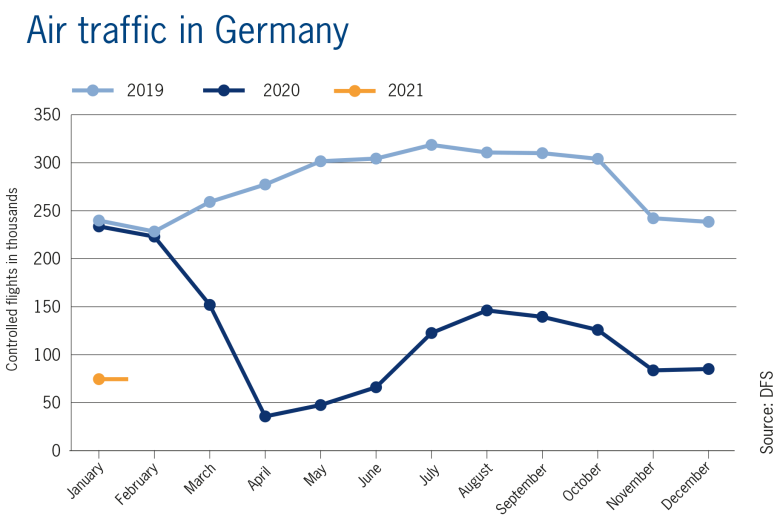
DFS, the German air navigation service provider, logged just over 75,000 take-offs, landings and overflights under instrument flight rules in Germany in January 2021. This is fewer than in December 2020 and two thirds fewer than in the same month last year.
In January 2021, DFS controlled fewer aircraft than ever before in its history. In total, DFS logged 74,543 take-offs, landings and overflights under instrument flight rules (IFR) in German airspace. This represents a further decline compared with the previous month, December 2020, when DFS recorded around 85,000 flight movements. Compared with the prior-year period, January 2020, the decrease amounted to 68.1 percent. A year ago, DFS recorded almost 234,000 flight movements in one month. "The year 2021 is starting even worse than the last one ended," said Dirk Mahns, Chief Operating Officer at DFS.
Only 41,774 take-offs and landings were recorded at Germany's designated international airports in January – 72.3 percent fewer than in the prior-year period. The number of overflights fell less sharply. In January 2021, their share amounted to 41.5 percent (January 2020: 38.9 percent). "These figures make it clear that air transport in Germany has been hit particularly hard by the COVID-19 pandemic," said Mahns.
The situation at the international airports was not uniform. Of the four major hub airports in Germany – Frankfurt, Munich, Berlin Brandenburg and Düsseldorf – Munich Airport recorded the largest decline in traffic with a drop of 84 percent. The declines at the airports in Germany where air freight accounts for a large share of total traffic were significantly lower. These include Frankfurt Airport (-63.7 percent), Cologne Bonn (-54.9 percent) and Leipzig Halle. In Leipzig, where the logistics service provider DHL, among others, has set up its air freight hub, traffic in January was almost at the same level as the previous year (-10.5 percent).
At the regional airports in Germany, the decline was below average (-55.5 percent). At Dortmund, the busiest regional airport in Germany, traffic fell by around 62 percent compared with the same month last year. It is followed by Frankfurt Hahn, which experienced a decline of 34 percent.
Downloads
Media contact:
Kristina Kelek:
Telephone +49 (0)6103) 707-4161
E-mail: presse@dfs.de
DFS Deutsche Flugsicherung GmbH, the German air navigation service provider, is a State-owned company under private law with 5,600 employees as at 31 December 2020. DFS ensures the safe and punctual flow of air traffic over Germany. Before 2020, around 2,200 air traffic controllers guided up to 10,000 flights in German airspace every day, more than 3 million movements every year. The company operates control centres in Langen, Bremen, Karlsruhe and Munich as well as control towers at the 16 designated international airports in Germany. The subsidiary DFS Aviation Services GmbH markets and sells products and services related to air navigation services, and provides air traffic control at nine regional airports in Germany and at London Gatwick Airport and Edinburgh Airport in the UK. R. Eisenschmidt GmbH is another DFS subsidiary which markets publications and products for General Aviation. Kaufbeuren ATM Training (KAT) is responsible for training military air traffic services personnel. DFS has been working on the integration of drones into air traffic since 2016 and has set up a joint venture, Droniq GmbH, with Deutsche Telekom.